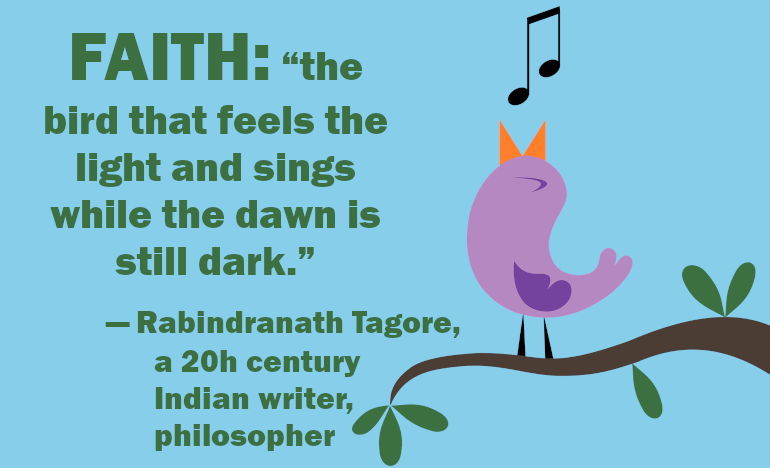The Blossoming of Faith

By Kathy Keary
Part 7. The full series is here: The Contemplative Spirit of Islam.
As we continue our exploration of the contemplative nature of the faith of our Muslim sisters and brothers, the three principles of Islam: surrender, faith, and moral virtue, shine like a radiant beacon for those on the journey. We refer you to our previous article on the topic of surrender. Surrendering to God: “Two Can Not Live in One Heart” Today our focus turns to the second principle: faith.
Rabindranath Tagore, a 20h century Indian writer, philosopher and recipient of the Nobel Prize in literature, eloquently characterized faith as “the bird that feels the light and sings while the dawn is still dark.” Imam Jamal Rahman asserts that this inner certainty of faith that Tagore speaks of is built from within (Rahman, 49).
Tagore’s words strongly resonate with me. Perhaps they do for you too. I distinctly recall that my faith was deeply buried under mounds of debris following my cancer diagnosis. By the grace of God, it resurfaced with added brilliance long before the dawn and carried me on its wings out of a state of intense desolation. At the time, I surmised that my faith must be a precious gem that the Divine implanted deep within me and was fertilized by years of the inner work of contemplative prayer. While this treasure was suppressed for a while, it emerged like the sun breaking through the clouds before the storm is over.
Note: Never miss an article published on the Renewal Center website: Sign up to receive our newsletters.
The Prophet Muhammad also described faith as not only a “confession with the tongue,” but also “a verification with the heart, and action of the body” (Rahman, 49). We refer you to our article, “Using Our Bodies in Prayer,” to highlight that this practice finds a home in other faith traditions as well.
Muslims are typically taught that a righteous way of being stems from prayer, regularly reciting the Qu’ran, and maintaining the frequent company of other believers “who are in awe of God.” Rahman points out that two other activities significantly build on this foundation: “Have your own experience of Truth and develop a relationship with your inner teacher.” (Rahman, 50). His description encapsulates the heart of a contemplative lifestyle. The act of connecting with, trusting, and being animated by one’s inner Wisdom is foundational to this way of being.
Many of our beliefs have been handed down to us rather than being born from a place deep within us. Even when we rely on Scripture, we are being moved by a source outside of ourselves. Rahman stresses the importance of experiencing sacred writings by engaging with them with not only our minds but also our hearts. This firmly plants faith into our lives where it can flourish. The author elaborates:
Through heartfelt experiences one matures; through the richness of experiences faith blossoms and one’s being transforms until, as the sages say, one becomes “rosy red with illumination.” What is fascinating is that at this stage one begins to radiate beauty and authenticity in everything one says or does (Rahman 51, 52).
We refer you to our article on Lectio Divina, sacred reading, which describes a method to engage with holy text in a fruitful way. See: Contemplative Prayer: The Five Steps of Lectio Divina.
Rahman warns against the common occurrence of failing to nourish our inner teacher, our inner guide. I enjoy the words of Rumi (Rahman, 54):
The Jesus of your spirit is within you:
ask his aid,
for he is a good helper.
Seeking the direction of a guide familiar with the spiritual landscape to assist in connecting with our own inner teacher can be beneficial. Rahman offers sound advice for selecting a teacher:
The true teacher is deeply compassionate. He or she sees all beings coming from the same sacred Source, healing, integrating, and transforming their personalities usually with some exertion and suffering, and returning to the Source. He {or she} helps us to become not like the teacher, but more our real selves.
As Prophet Muhammed wisely articulates: “The teacher kindles the light. The oil is already in the lamp” (Rahman, 57). We refer you to our article, “Spiritual Direction: A Path to Interior Freedom” for further insight on the value of spiritual direction.
Next week we will turn our focus to the third and final principle of Islam: moral virtue. We will then explore the five pillars of Islam from a contemplative perspective.
NOTE: The Renewal Center staff will be leading a book discussion on Rahman’s book Spiritual Gems of Islam on Saturdays and Tuesdays in June.
Reference
Rahman, Jamal. The Fragrance of Faith: The Enlightened Heart of Islam. Bath, England: The Book Foundation, 2004.
[Kathy Keary, a Precious Blood Companion and spiritual director, holds a master’s degree in theological studies and is a graduate of the Atchison Benedictine’s Sophia Center’s Souljourners Program, an intense study of spirituality and spiritual direction. Kathy believes that the divine is present and active in all of life and encourages others to be awakened to the God in all including the divine within. She enjoys accompanying others on their journey to wholeness discovering the person they were created to be.]
We’d Like to Hear From You!
We’d like to know what you think about this article. Send us a comment using the form below. Do you have a suggestion? Is there something you want to learn more about? Send us a note.
Image by OpenClipart-Vectors from Pixabay
Related

Pilgrims of Hope, Episode 6: Walking with Cancer Survivors
Hosted by Fr. Ron Will, C.PP.S.
We are talking with people who find hope amid difficult circumstances or bring hope to others. In this episode, Kathy Keary talks about how centering prayer, journaling and other spiritual practices helped her cope with two life threatening health issues.

The Rollercoaster Torture
An Assembling God’s Puzzle video
By Fr. Garry Richmeier, C.PP.S.
Life is full of ups and downs, like a roller coaster, and that fact is a piece of life’s puzzle that we must deal with. Depending on how we deal with it, it can be torture, or it can be simply another difficult aspect of life to be navigated. How do we avoid the torture?
Categories
Assembling God's Puzzle Coffee with Padre Cooking & Spirituality Encounters of the 4th Kind Family Matters Reflections on the Eucharsitic Prayers Spiritual Resources Taize Prayers The Contemplative Life Traveling with Pilgrims of Hope Uncategorized Videos Week of Prayer for Uhristian Unity When you need a little help
